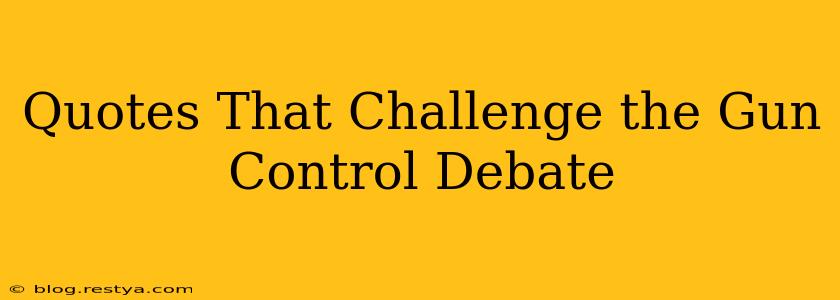Quotes That Challenge the Gun Control Debate: A Deeper Dive into Complex Issues
The gun control debate is a deeply divisive issue in many countries, fueled by strong emotions and deeply held beliefs. It’s rarely a simple matter of black and white, and understanding the nuances requires exploring various perspectives. This exploration isn't about taking sides, but rather about understanding the complexities through powerful quotes that challenge our assumptions and force us to consider the multifaceted nature of the problem.
Instead of simply presenting a list of quotes, we will delve into the context and implications of each, examining the arguments they represent and the questions they raise. We’ll also consider the counterarguments and the broader societal implications.
"The right of the people to keep and bear arms shall not be infringed." - Second Amendment to the United States Constitution
This foundational quote for the gun rights debate in the United States is often cited as the cornerstone of the argument for unrestricted gun ownership. However, the interpretation of "well-regulated militia" and the meaning of "infringed" have been endlessly debated. This quote itself doesn't provide a solution; it highlights the core disagreement: what constitutes a “well-regulated militia” and what limitations, if any, are permissible on the right to bear arms? The ongoing legal battles and varying interpretations demonstrate the complexity of this seemingly straightforward sentence.
"Guns don't kill people; people kill people."
This frequently heard phrase simplifies a complex issue. While technically true, it ignores the significant role that readily available firearms play in escalating conflicts and increasing the lethality of violence. The ease of access to guns undeniably impacts the frequency and severity of gun-related deaths. This quote often serves as a rhetorical device to deflect from the discussion of gun control measures, focusing instead on individual responsibility. However, it overlooks the societal and environmental factors that influence behavior and the impact of readily accessible weapons on violence rates.
"If guns were outlawed, only outlaws would have guns."
This quote underscores a key concern about the enforceability of strict gun control laws. The argument suggests that complete bans are impractical and that criminals will always find ways to obtain weapons, regardless of legislation. This argument highlights the challenges of enforcement and the potential for a black market to flourish. However, it doesn't address the potential benefits of stricter regulations for law-abiding citizens, such as reduced gun violence among non-criminals.
"The only thing that stops a bad guy with a gun is a good guy with a gun."
This quote promotes the idea of armed citizenry as a deterrent to crime. The argument suggests that the presence of armed individuals can prevent mass shootings or other acts of violence. However, this ignores the potential for increased accidental shootings, escalation of conflicts, and the difficulties in reliably identifying "good guys" in rapidly unfolding situations. The potential for misidentification and accidental shootings undermines the validity of this argument.
How do different countries approach gun control, and what are the outcomes?
Different countries have drastically different approaches to gun control, reflecting diverse cultural norms, historical contexts, and political systems. Some countries have very strict gun control laws, resulting in significantly lower rates of gun violence. Others have more permissive regulations, leading to higher rates of gun-related deaths. A comparative study of these different approaches and their outcomes is crucial to understanding the complex relationship between gun control policies and societal impacts. The success of any gun control measure is highly dependent on its specific implementation and enforcement, making simple comparisons challenging.
This exploration aims to demonstrate the multifaceted nature of the gun control debate. It’s not about choosing sides but about encouraging critical thinking and a deeper understanding of the complexities involved, using quotes as springboards for thoughtful consideration. The arguments are interconnected and require careful examination of both sides to foster a more nuanced understanding.

